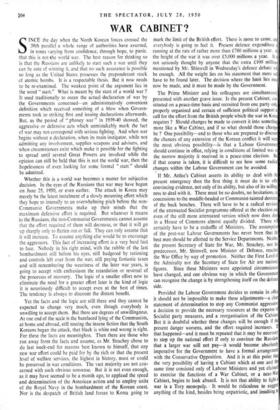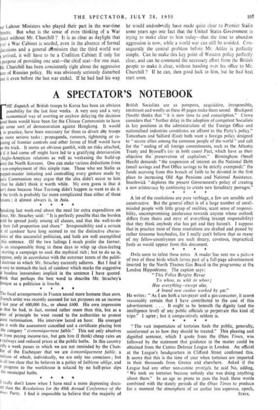WAR CABINET ?
SINCE the day when the North Korean forces crossed the 38th parallel a whole range of authorities have asserted, in tones varying from confidence, through hope, to panic. that this is not world war. The best reason for thinking so is that the Russians are unlikely to start such a war until they can be sure of winning it, and that no such assurance is possible so long as the United States possesses the preponderant stock of atomic bombs. It is a respectable thesis. But it now needs to be re-examined. The weakest point of the argument lies in the word " start." What is meant by the start of a world war ? It used traditionally to mean the actual declaration of war by the Governments concerned—an administratively convenient definition which received something of a blow when Govern- ments took to striking first and issuing declarations afterwards. But, as the period of " phoney war " in 1939-40 showed, the aggressive or defensive acts which unmistakably mark the fact of war may not correspond with serious fighting. And when war begins without a declaration, when its main instigator, while not admitting any involvement, supplies weapons and advisers, and when circumstances exist which make it possible for the fighting to spread until several Great Powers are involved while the opinion can still be held that this is not the world war, then the hopelessness of even looking for some formal " start " should be admitted.
Whether this is a world war becomes a matter for subjective decision. In the eyes of the Russians that war may have begun on June 25, 1950, or even earlier. The attack in Korea may merely be the latest instalment of a slowly mounting effort which they hope to intensify to an overwhelming pitch before the non- Communist Governments make up their minds that the maximum defensive effort is required. But whatever it means to the Russians, the non-Communist Governments cannot assume that the effort required of them will decrease, or that it will go up sharply only to flatten out or fall. They can only assume that it will increase. To assume anything else would be to encourage the aggressors. This fact of increasing effort is a very hard fact to face. Nobody in his right mind, with the rubble of the last . bombardment still before his eyes, still badgered by rationing and controls left over from the war, still paying fantastic taxes and still remembering the weariness of the later war years, is going. to accept with enthusiasm the retardation or reversal of the processes of recovery. The logic of a smaller effort now to eliminate the need for a greater effort later is the kind of logic it is notoriously difficult to accept even at the best of times. The tendency is always to discount the distant benefit.
Yet the facts and the logic are still there and they cannot be expected to change very much, even though everybody is unwilling to accept them. But there are degrees of unwillingness. At one end of the scale is the barefaced lying of the Communists, at home and abroad, still touting the insane fiction that the South Koreans began the attack, that black is white and wrong is right. For these the facts are meaningless. Then there are those who run away from the facts and assume, as Mr. Strachey chose to do last week-end for reasons best known to himself, that any new war effort could be paid for by the rich or that the present level of welfare services, the highest in history, must or could be preserved in war conditions. The vast majority are not con- cerned with such obvious nonsense. But it is not even enough, as it may have seemed to be a month ago, to applaud the speed and determination of the American action and to employ units of the Royal Navy in the bombardment of the Korean coast. Nor is the despatch of British land forces to Korea going to mark the limit of the British effort. There is more to come, and everybody is going to feel it. Present defence expenditure is running at the rate of rather more than £780 millions a year. At the height of the war .it was over £5,000 millions a year. It is not seriously thought by anyone that the extra £100 millions mentioned by Mr. Shinwell in Wednesday's defence debate will be enough. All the weight lies on his statement that more win have to be found later. The decision where the limit lies must now be made, and it must be made by the Government.
The Prime Minister and his colleagues are simultaneously presented with another grave issue. Is the present Cabinet, con. stituted on a peace-time basis and recruited from one party only properly organised and certain of sufficient political support to call for the effort from the British people which the war in Korea requires ? Should changes be made to convert it into somethint more like a War Cabinet, and if so what should those changes be ? One possibility—and to those who are prepared to discount the chances of any extension of the Korean conflict it will seem the most obvious possibility—is that a Labour Government should continue in office, relying in conditions of.limited was o the narrow majority it received in a peace-time election. But if that course is taken, it is difficult to see how some radic• changes within the Labour Government can be avoided.
If Mr. Attlee's Cabinet asserts its ability to deal with the present emergency then the first thing it must do is to offer convincing evidence, not only of its ability, but also of its willing• ness to deal with it. There must be no doubts, no hesitations, no concessions to the muddle-headed or Communist-tainted denizens of the back benches. There will have to be a radical revision of the attenuated Socialist programme offered at the election and even of the still more attenuated version which now does duty in a House of Commons almost equally divided. There will certainly have to be a reshuffle of Ministers. The assumption of the post-war Labour Governments has never been that the best men should be allotted to the Service Departments. Neither the present Secretary of State for War, Mr. Strachey, nor his predecessor, Mr. Shinwell, now Minister of Defence, reached the War Office by way of promotion. Neither the First Lord of the Admiralty nor the Secretary of State for Air are national figures. Since these Ministers were appointed circumstances have changed, and one obvious way in which the Government can recognise the change is by strengthening itself on the defence side.
Provided the Labour Government decides to remain in office it should not be impossible to make these adjustments—a clear statement of determination to stop any Communist aggression. a decision to provide the necessary resources at the expense of Socialist party measures, and a reorganisation of the Cabinet. But it is doubtful whether these changes will be enough if the present danger worsens, and the effort required increases. If that happened—and it must be repeated that it may be necessary to step up the national effort if only to convince the Russians that a larger war will not pay—it would become absolutely imperative for the Government to have a formal arrangement with the Conservative Opposition. And it is at this point that the very possibility of having a Cabinet which at one and the same time consisted only of Labour Ministers and yet claimed to exercise the functions of a War Cabinet, or a near-Wal Cabinet, begins to look absurd. It is not that ability to fight a war is a Tory monopoly. - It would be ridiculous to suggest anything of the kind, besides being unpatriotic, and insulting to se Labour Ministers who played their part in the war-time inets. But what is the sense of even thinking of a War inet without Mr. Churchill ? It is as clear as daylight that ver a War Cabinet is needed, even in the absence of formal larations and a general admission that the third world war arrived, it will have to be a Coalition Cabinet if only for purpose of providing one seat—the chief seat—for one man. r. Churchill has been consistently right about the aggressive ure of Russian policy. He was obviously seriously disturbed ut it even before the last war ended. If he had bad his way he would undouboally have made quite clear to Premier Stalin some years ago one fact that the United States Government is trying to make clear to him today—that the time to abandon aggression is now, while a world war can still be avoided. Con- sequently the central problem before Mr. Attlee is perfectly simple. Can he make this key point of Western policy perfectly clear, and can he command the necessary effort from the British people to make it clear, without handing over his office to Mr. Churchill ? If he can, then good luck to him, but he had best start soon.



































 Previous page
Previous page